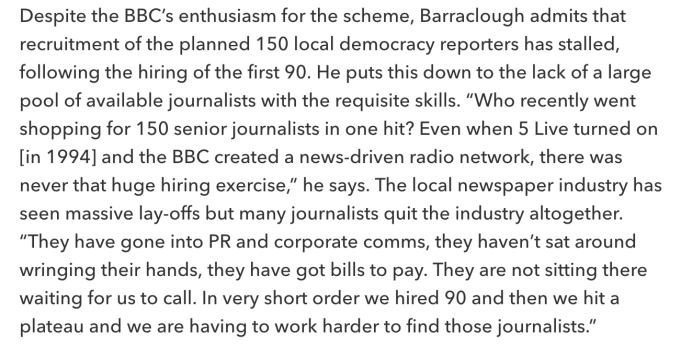I’m on tour in a month’s time.
The list on the back of my tour merchandising t-shirt wouldn’t be all that long: Bristol, Bath, Gloucester, Stroud – and Bristol again.
But it’s a chance to look up old friends and to strengthen links with newsrooms and other media employers around our region.
I know that in one of those newsrooms I will run into one of our most recent graduates.
It’ll be lovely to see her.
It would be equally lovely to think that I might bump into more of our finest former students.
But the appetite of young people for life in a regional newsroom isn’t always all that it might be.
The anecdotal evidence has been there for some time – and in previous jobs I spent a fair bit of time trying to come up with new ways to sell vacancies on small titles to what felt like a diminishing pool of interested talent.
But in May, I saw the first concrete reference to the problem – in an authoritative report from the Reuters Institute for the Study of Journalism, which highlighted the recruitment headaches faced by regional newsrooms.

And there was a hint at another cause, too….

Journalism was always a job where mission and vocation teamed with mischief and camaraderie trumped financial reward and the desire for work-life balance.
But maybe that uneasy pact has come unstuck as a new generation either wants more from its working life – or has developed a greater ability to see the new clothes of some media firms’ top digital emperors.
My colleagues and I work day in, day out, to inspire our students to think of journalism as an amazing privilege. But we rely on our industry friends to help turn the flickering flame into the fire in the belly.
That recruitment issue has emerged again with the revelation that the filling of the remaining vacancies for the BBC-funded Local Democracy Reporter scheme has virtually ground to a halt.

Once again, money has been advanced as a sticking point – although in the early stages of the scheme, the quality of applicants was said to be incredibly high.
BBC Local Democracy Project finding it hard to hire enough reporters because so many have left the industry. Could try paying higher wage ? https://t.co/vmHNp4YglM
— Mark Hanna (@MarkHannaMedia) July 13, 2018
The difficulty of finding the right person for the important job of holding power to account across the country has been tellingly shown in the debacle of the LDR for Harrogate.

A writer with a public track record of being a thorn in the flesh of his local council, with clear axes to grind, was appointed to a role where BBC-style balance and impartiality were key. What could possibly go wrong?
I agree that the £22,000-a-year salary for the LDR jobs is far from generous.
But from my understanding of the situation, the roles offer a degree of autonomy – a reporting right to roam, if you like – that traditional newsroom jobs increasingly lack.
So if we’re struggling to fill these jobs, the image problem of the regional media is a very real one.
I’ve watched with a glow of pride as one of the titles in my home county, the Salisbury Journal, has flown a flag for honest, hard-working, supportive reporting in extraordinarily difficult circumstances with its coverage of the two poisoning incidents on its doorstep.
Much of that coverage has involved its now head of news, Rebecca Hudson, who has been rightly praised for her dedication, determination, and defence of her home patch.
Aside from some very healthy web figures, there haven’t been many silver linings for the 23-year-old and her tiny team.
But the saga has had one positive impact: for the time being, at least, it’s kept her in journalism.

We can’t have – and wouldn’t want – Russian-backed murder conspiracies paralysing communities in every news patch of this land.
So for the sake of a healthy democracy, the industry needs to be honest about why we’re not recruiting more Rebeccas – and why the ones we have are so easily tempted to leave.
